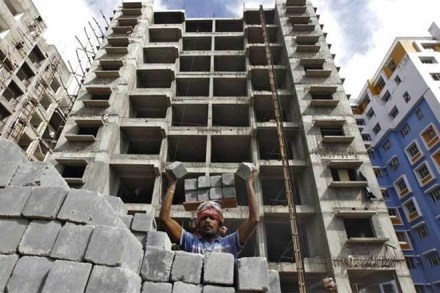India’s real estate sector, which has been facing multiple headwinds in the past few years, got further mauled by the Covid-29 pandemic with industry sentiments hitting a historic low during the January-March 2020 quarter mirroring domestic and global economic concerns, a survey report said.
The Knight Frank-Ficci-Naredco real estate sentiment index Q1 2020 survey shows that current sentiments of real estate stakeholders have nosedived to an all-time low of 31. “The survey further indicates that future sentiment score outlining the industries’ market expectations has also dipped well into the pessimistic zone at a score of 36 in Q1 2020 against the score of 59 in Q4 2019 calendar year (CY),” the report said.
For comparison sake, a score of more than 50 signifies ‘optimism’ in sentiments, while 50 means the sentiment is ‘same’ or ‘neutral’, and a score below 50 signifies ‘pessimism’. The real estate industry that had just about started showing some signs of revival during the last quarter of 2019 suffered a severe setback due to the ongoing novel corona virus (Covid-19) epidemic, it added.
The score had revived in Q4 2019 CY after being in pessimistic zone (below 50 mark) for two back-to-back quarters, but was short-lived, as the current sentiment score fell to 31 in January-March 2020. The stakeholder’s mood with regards to overall economy and real estate had been in pessimistic zone in Q2 and Q3 2019 due to the credit squeeze and economic slowdown. But, a slew of measures announced by the government to revive realty saw Q4 2019 infusing confidence in the market.
The creation of a stressed asset fund (AIF) of Rs 25,000 crore to provide last mile funding to stalled affordable housing projects was a welcome step in this direction. However, the outbreak has marred sentiments again. Knight Frank India chairman & MD Shishir Baijal said the pandemic has created an unprecedented condition, which is impacting global markets and societies. There is already a severe shortage of liquidity due to the complete standstill that most economies have come to.
Even while the government and Reserve Bank of India (RBI) have provided some stimulus, further support may be required to help real estate and for the economy to stay afloat during the crisis. Managing liquidity and sustaining through the length of this pandemic will be critical for economic survival in the post-pandemic era, he added.
“Real estate segment specifically will have a longer journey to make. This crisis has retracted the end-user confidence to its lowest levels ever, which will push any kind of real estate purchase decisions to the distant future. The already ailing real estate sector has been crippled with this pandemic, making it imperative for government support to bring it back on track,” Baijal pointed out.
